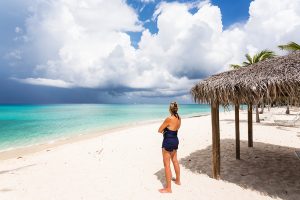September 16. The Caribbean is one of the regions of the world most vulnerable to climate change. Its large coastal populations and exposed location leave it at the mercy of rising sea levels, stronger storms, and worsening drought. Increasing temperatures, meanwhile, threaten its unique biodiversity. Despite their meager contributions to global greenhouse gas emissions, the Caribbean’s thirteen sovereign nations are already bearing the brunt of these climate disruptions, putting many of these tourism-dependent countries deeply in debt and spurring increased migration across the region.
Scientists say that without immediate action, the Caribbean could eventually become nearly uninhabitable. Countries such as Barbados and Dominica have implemented a range of mitigation and adaptation measures, including increasing public spending on resilient infrastructure, and many have set ambitious targets for emissions reductions. But with the region requiring significantly more help to stave off the worst effects, some leaders in particular are pushing for fundamental reforms of global development aid and climate financing.
The region’s governments have recognized climate change as one of their top concerns. Many have committed to ambitious timetables to reduce their greenhouse gas emissions as part of the 2015 Paris Agreement; others are seeking to generate more power from renewable energy and limit their use of fossil fuels, among other measures.
Under Prime Minister Mia Mottley, Barbados has developed a plan to phase out fossil fuels entirely by 2030 and created a national strategy to boost climate resilience, known as Roofs to Reefs. The program will direct public investment toward reinforcing home construction; increasing sustainable land use; improving freshwater storage capacity; and restoring coral reefs, which help protect coastlines from waves, storms, and floods.
In 2020, Jamaica became the first Caribbean country to submit an updated climate action plan that sets more ambitious targets for reducing emissions in both the energy and land-use sectors.
Meanwhile, Dominica has created a new agency to position it as a world leader in climate-resilience efforts by the end of the decade.
Source: cfr












